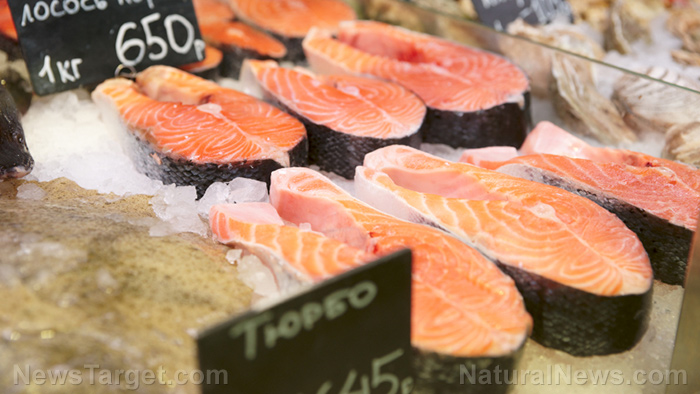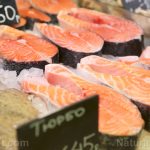
Hong Kong plans widespread BAN of Japanese sea products if Fukushima dumps nuclear water into the ocean
Tuesday, July 18, 2023 by Olivia Cook
http://www.products.news/2023-07-18-hong-kong-ban-japanese-sea-products-fukushima.html

Japan’s plan to discharge nuclear wastewater from the Fukushima nuclear power plant over the next three decades has prompted officials in Hong Kong to propose a very widespread import ban on Japanese aquatic products.
Hong Kong Special Administrative Region Chief Executive John Lee recently said the city will ban seafood products from at least 10 Japanese prefectures if Tokyo goes ahead with its plan to discharge treated radioactive water from the crippled Fukushima plant into the ocean. (Related: UN approves large Fukushima discharge into Pacific Ocean, prompting China to ban Japanese seafood imports.)
Under the plan, about 1.2 million cubic meters of water that have been used to cool the fuel rods of the wrecked Fukushima Daiichi Nuclear Power Station will be released over the next 30 to 40 years in order to prevent accidental leaks and to allow for the plant’s full decommissioning.
This plan has been approved by the United Nations’ nuclear watchdog, the International Atomic Energy Agency, which has claimed that the plan to release nuclear water is consistent with international safety standards.
The agency further claimed that “controlled, gradual discharges of the treated water to the sea” as currently outlined in the Japanese government’s plan in coordination with the plant operator, Tokyo Electric Power Co., would have a “negligible radiological impact on people and the environment.”
Hong Kong ban could cause 30 percent of Japanese restaurants to shut down
Lee said he has asked the Environment and Ecology Bureau to form a multi-department team to design the city’s action plan as part of the “decisive action” Hong Kong’s government will take against Japan.
The current plan will extremely tighten scrutiny on food from Japan and maintain curbs on certain Japanese imports. The products in the proposed ban will include all live, frozen, chilled, dried or otherwise preserved aquatic products, sea salt and seaweed.
The government noted that the proposed measure is based on the “precautionary principle” of ensuring all food products from Japan were fit for consumption.
“The discharge plan is unprecedented and would last for 30 years. During this long period of time, if the purification system fails to operate effectively, it can pose significant risks to food safety and marine ecology,” said a government spokesperson.
Although official confirmation of the discharge date is at present unclear, local catering sector leaders have said that under the ban, business for Japanese restaurants in the city could be halved and some 30 percent of them are likely to close down.
Hong Kong is Japan’s second-largest market for agricultural and fisheries exports, next to Mainland China. In 2022, Japan exported 75.5 billion yen ($546 million) in fishery products to Hong Kong.
Dennis Wu, executive director of the Hong Kong Japanese Restaurant Association, said members are concerned and making plans for the potential ban. They are also worried about customers losing confidence.
“So far the customers are still willing to dine in but they indicated that once the Japanese government discharges the wastewater, they will stop having Japanese seafood for a certain period of time,” Wu said.
Shinya Goshima, the owner of the Michelin-starred Japanese restaurant Godenya in the Sheung Wan district on Hong Kong Island, said the affected ingredients account for about 10 percent of the restaurant’s imports, and he is currently looking for substitutes from other parts of Japan.
Secretary for Environment and Ecology Tse Chin-wan declared that restaurants in Hong Kong will not receive any compensation from the government for a drop in business if the city bans seafood imports from Japan over a planned discharge of contaminated wastewater from the Fukushima power plant.
The environment chief said industry operators had been warned over the possible ban and given ample time to prepare following regular dialogue.
Visit Radiation.news for more stories about the nuclear wastewater from Fukushima nuclear power plant.
Watch this video featuring the International Atomic Energy Agency‘s decision to allow Fukushima nuclear water to be dumped into the Pacific Ocean.
This video is from the Cynthia’s Pursuit of Truth channel on Brighteon.com.
More related stories:
Japan gets green light to release Fukushima radioactive water into Pacific Ocean.
Japan begins secret discharge of RADIOACTIVE WATER from Fukushima nuclear plant into the ocean.
Sources include:
Tagged Under: Tags: badpollution, banned, big government, China, clean water, Dangerous, Ecology, environment, food supply, Fukushima, Hong Kong, Japan, nuclear, nuclear waste, nuclear wastewater, ocean health, radiation, radioactive waste, radioactive water, water pollution, Water Wars
RECENT ARTICLES


Hong Kong plans widespread BAN of Japanese sea products if Fukushima dumps nuclear water into the ocean
By Olivia Cook

Surgical tools from Johnson & Johnson RECALLED due to increased risk of injury and death
By Zoey Sky

Aspartame declared a POSSIBLE CARCINOGEN by WHO cancer arm, but regulatory agencies still insist it’s safe
By Olivia Cook

Nobody is buying electric cars, but automakers continue to manufacture them in accordance with “green” agenda
By Ethan Huff
COPYRIGHT © 2017 PRODUCTS NEWS


